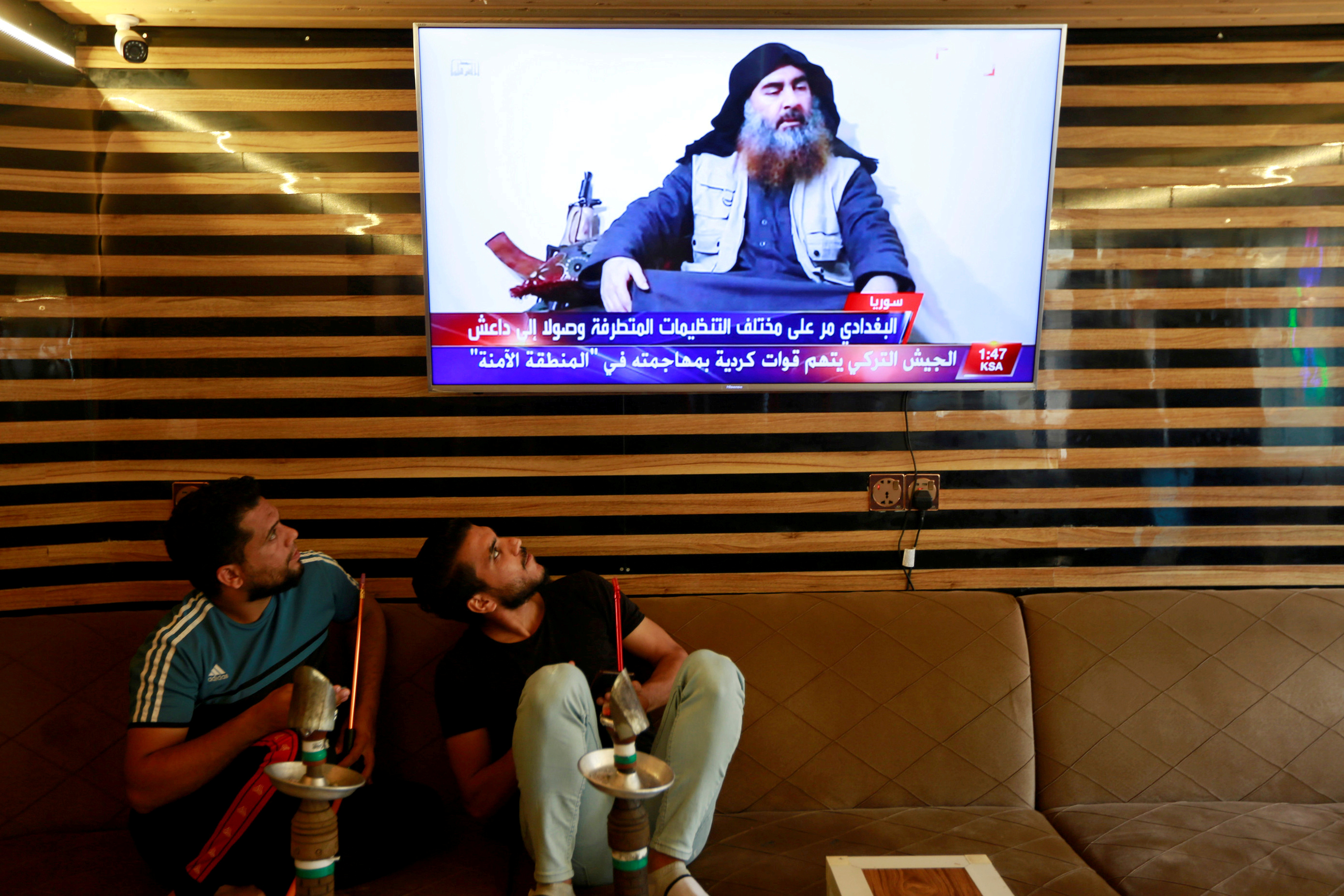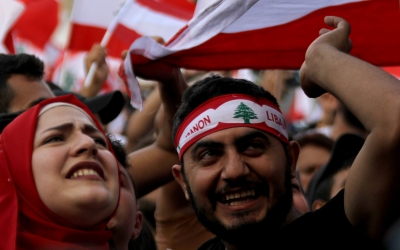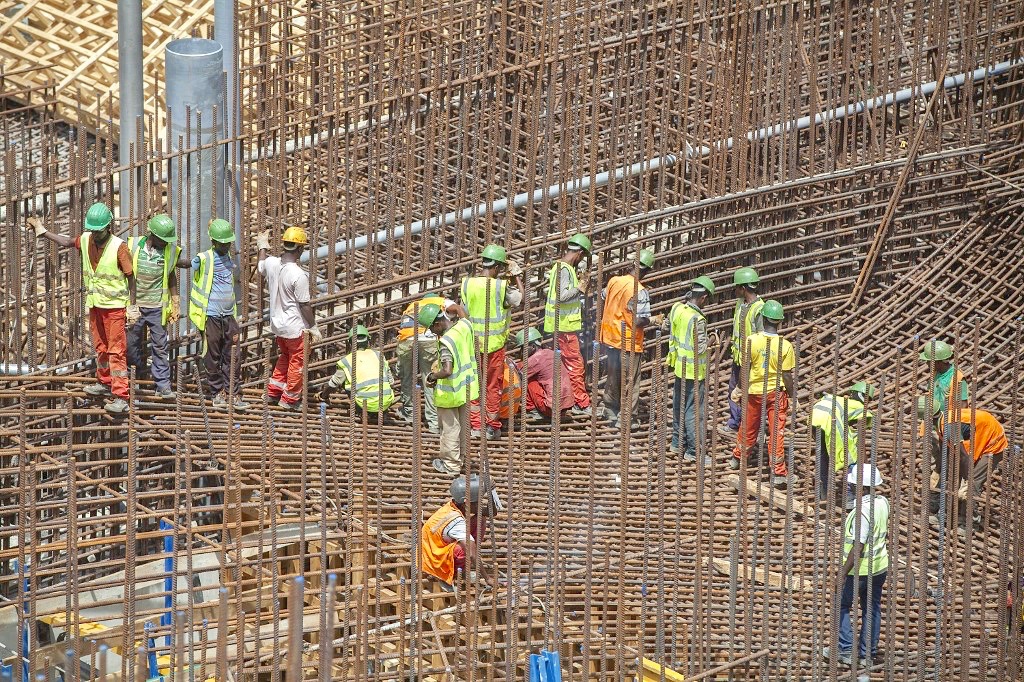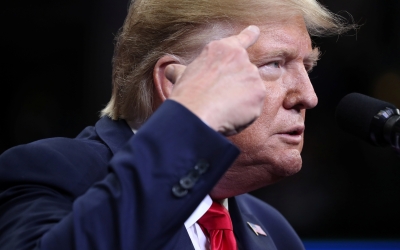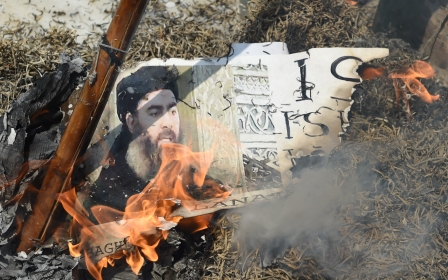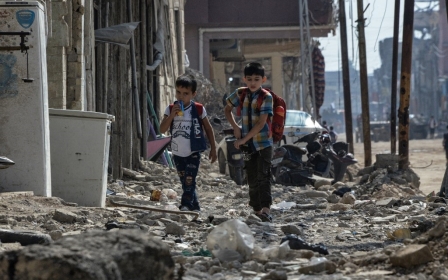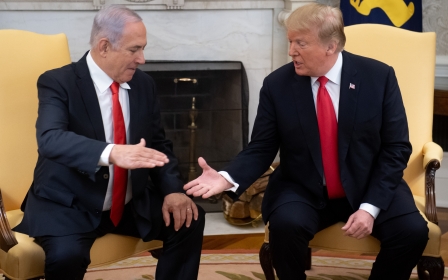Baghdadi is dead but the West's backing for dictators keeps the fires burning
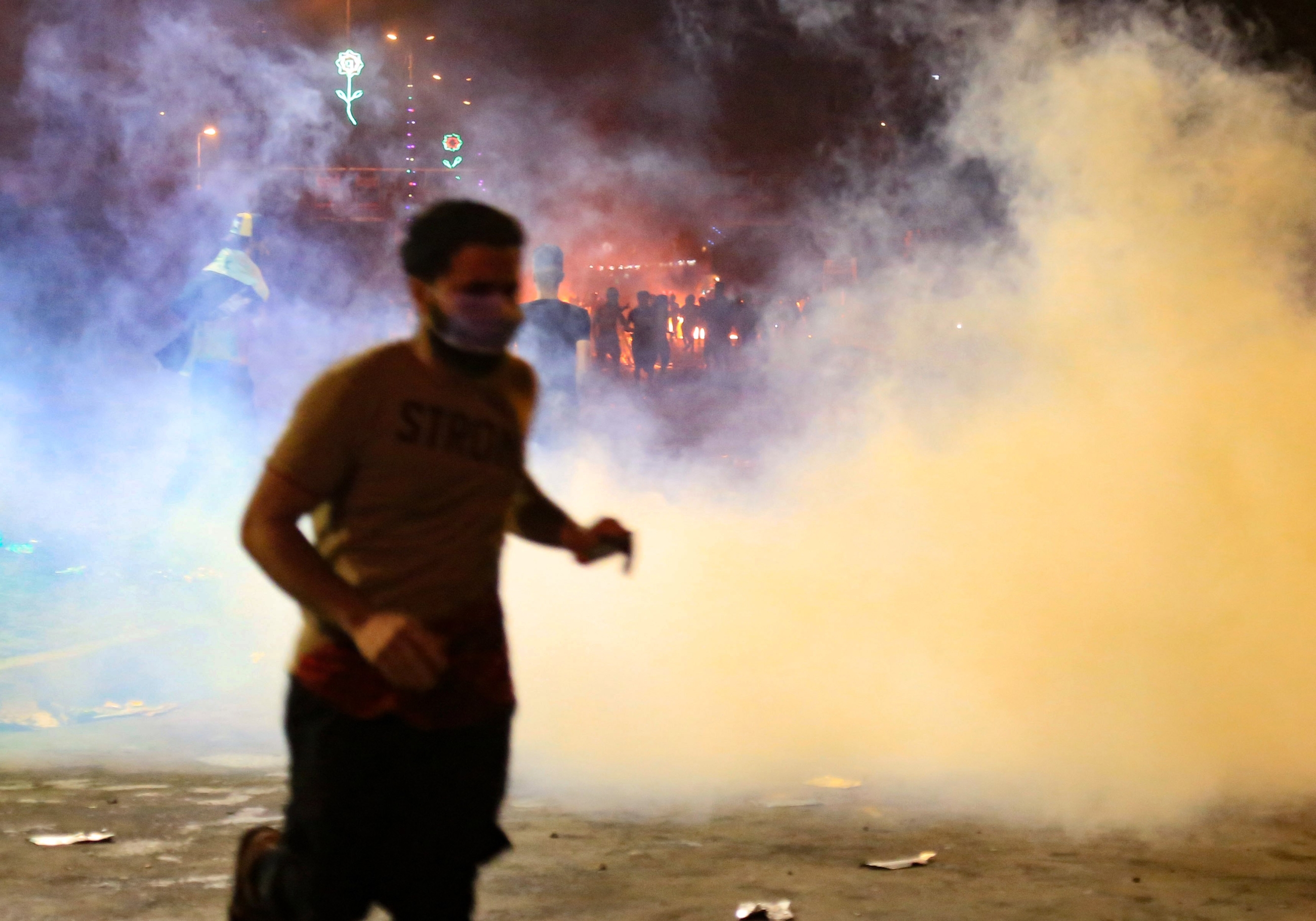
When US Defence Secretary Mark Esper was asked this week to confirm President Donald Trump's assertion that Islamic State group (IS) leader Abu Bakr al-Baghdadi died "whimpering and crying" as he ran into a tunnel, he said he couldn’t: "I don’t have those details."
As someone who has never seen action in his life, and watched this snuff movie from footage taken from helicopters, Trump felt the urge to embellish the drama of what happened below ground. Or maybe the commander-in-chief got these exclusive quotes from the "wonderful" dog the Navy Seals sent in after Baghdadi.
A familiar issue was on display here. Each time an al-Qaeda or an IS leader is killed, the West makes the mistake of declaring the problem over, without considering or acknowledging the context and the conditions which allowed formerly insignificant figures to rise to power and prominence.
Mission accomplished?
Fantasising about the end of al-Qaeda and IS in terms which carry echoes of the Old Testament's vengeful God is an occupation more than one leader has indulged in.
Baghdadi himself was a direct product of Bush and Blair's decision to invade Iraq in 2003
George Bush, Tony Blair, Vladimir Putin, Nicholas Sarkozy and David Cameron have all claimed "mission accomplished" about their various interventions in the Middle East. The result of their endeavours can be seen today: Syria is destroyed and under permanent occupation, Yemen and Libya are wracked by civil war and Iraq is crippled.
Baghdadi himself was a direct product of Bush and Blair's decision to invade Iraq in 2003.
Like many Iraqis who hail from Samarra, Baghdadi joined the Iraqi Sunnis' fight against the US invasion. He co-founded the Jamaat Jaysh Ahl al-Sunnah wa-l-Jamaah group (JJASJ), was captured in Fallujah, held at Abu Ghraib and Camp Bucca - described later as a "Jihadi university" - and was released after less than ten months. He passed under the radar, a shortsighted cleric who enjoyed playing football, a man of no import.
By the time the US withdrew from Iraq in 2011, IS was considered so insignificant that the bounty put on one of its leaders dropped from $5m to $100,000. John Brennan, the CIA director at the time, called IS "pretty much decimated" with around 700 adherents. Brennan was right. Squeezed first by the tribal Sahwa - or Awakening - movement and then by the Arab Spring in 2011, IS had become isolated from its own Sunni community and disowned by al-Qaeda.
Crushing the Arab Spring
Help for Baghdadi was to arrive once again from the US's regional allies, who conspired to topple Mohamed Morsi, Egypt's first democratically elected president in a military coup that the US never acknowledged as such.
The crushing of the Arab Spring in 2013 - at the hands of Saudi Arabia and UAE - and with it the hope of millions of Arab citizens that change could be brought about peacefully and democratically, was the biggest shot in the arm for IS in general, and Baghdadi in particular.
The crushing of the Arab Spring in 2013 was the biggest shot in the arm for IS in general, and Baghdadi in particular
It resurrected both man and organisation when IS and the idea it represented was on its knees. It provided them with support in an Iraq riven by sectarian hatreds, a battlefield in Syria and a limitless supply of foreign fighters.
The same mistake is being made today when Trump invites us to consider Baghdadi’s death a turning point for IS. The context and conditions that gave life to people like Baghdadi and groups like IS are ignored, brushed aside by bullish leaders glorying in successful hits.
One of these ignored conditions is the West’s absolute and resolute faith in dictators as the model of control. Another is the absolute inability of those dictators to provide a model of governance which allows their countries to progress. A third is the degree of economic and social distress felt by millions of people around the Arab world.
The same conditions which launched the Arab Spring eight years ago can be seen today on the streets of Baghdad. Iraqis are in uproar against a sectarian government, shortages of electricity, clean water, and the collapse in education, health and security. The political elite, all allied either to the US or Iran, are fighting each other. They are stealing. Despite Iraq's oil wealth, no major infrastructure projects have been started.
This is the land the US created in Iraq.
Cast your gaze further afield, and you will see civil turmoil in Lebanon; Syria cut up into three different protectorates; Yemen divided at least the same number of ways as a result of Mohammed bin Salman’s "lightning strike" four years ago; Khalifa Haftar stuck outside Tripoli in Libya; huge weekly demonstrations in Algeria as the people and the military battle it out.
Nothing has changed with the western policies that have fuelled this catastrophe. Trump, as Barack Obama did before him, has persistently said he is pulling US troops out of the Middle East. The day after announcing the withdrawal from Syria, he sent 2000 troops to Saudi Arabia.
After Baghdadi’s end, the US has started reinforcing its positions around the oil fields in eastern Syria. Going back on himself once again when it comes to the troop withdrawal from Syria, Trump said: "Keep the oil, I’ve always said that. We’ve secured the oil." His aim, he said, was to secure a US share of Syrian oil revenues.
At least with Trump, the lip gloss of pursuing higher motives has been removed. But the essence of western policy in the Middle East has not changed since 2003. It goes something like this: Ignore Algeria, Yemen, Libya, Syria - they are lost causes and don’t matter anyway. Concentrate on two capitals only - Jerusalem and Cairo - and if they look secure, what’s the problem?
But here again, myopia and stupidity compete with each other for prominence.
What guarantees that the explosion we are seeing around the Arab world won’t reach them? Take Egypt’s alleged stability under the decaying rule of Trump’s favourite dictator, the "killer" Abdel Fattah el-Sisi.
Mismanaging Egypt
Firstly, Sisi has fallen out with his chief backer Saudi Crown Prince Mohammed bin Salman. Egypt is no longer receiving free oil from the Gulf state, a senior source in Saudi Arabia tells me. Which is why the Egyptian president was witnessed swearing against Mohammed bin Salman when the Iraqi prime minister came to Cairo. Sisi was presumably searching for free Iraqi oil
The scale of the economic mismanagement, all to maintain the privileges enjoyed by the Egyptian Army, is colossal
Egypt's foreign debt keeps mounting. It has gone from $106.2bn at the end of March to $108.7bn by the end of June, according to Egypt’s Central Bank. It has increased by $16bn in one year.
The scale of the economic mismanagement, all to maintain the privileges enjoyed by the Egyptian army, is colossal. Egypt under Sisi is a black hole for foreign investment.
Domestically, Egyptians feel - and actually are - poorer by the month. All it takes is one whistleblower, like Mohamed Ali, to send mass demonstrations into the streets nationwide, and trigger the arrest and detention of hundreds of people from across the political spectrum.
That’s how vulnerable Sisi is. However, all of this is just a taste of things to come compared to the problems the president is storing up for himself over Egypt’s water supply, which is truly an existential issue for the country.
A dam shame
The Ethiopian project to build a mega dam for electricity generation upstream has been around for some time and was rejected by Mohamed Morsi in his sole year as president in 2012. The dam project accelerated after Sisi signed an initial agreement with Ethiopia and Sudan.
At the time, Egyptian negotiators were told that Ethiopia intended a temporary cut in supplies to the Nile, as it would take three years to fill the lake behind the dam, after which the supply to Egypt would return to normal. There were concerns about this claim from Egyptian irrigation experts even in 2015.
One such expert, who is well informed about the negotiations that took place between Egypt and Ethiopia, told MEE: "If the dam is filled in three years as the Ethiopians want, the water level of the Nile in Egypt will be low to the extent that a lot of pipes of the pumps will be exposed.
When this level becomes as low as this, the Delta, the most fertile area of Egypt, if this level of Nile came down, the water of the sea will come in, which means the soil of the Delta will be salty and not suitable for a lot of agriculture."
The expert explained that Egypt does not get a lot of rain water annually, so groundwater comes from the Nile itself. If the level of the Nile is lowered, groundwater will not be replaced. There are also Egyptian concerns that the water in the dam will not be used for electricity generation only.
The expert said: "The Ethiopians publicly claim that they will not use the water for agriculture, and that after three years, they claim the level of water going to Egypt will be the same as now.
"This is not true, the Ethiopians are giving land to foreign investors, now they are dividing it and giving it to domestic and foreign investors. They will use 20-30 percent of the water going to Egypt permanently, which has a huge impact on Egypt. There is no other source of water for Egypt."
If any collapse in Egypt is capable of sending even a fraction of its population northwards to Europe, it surely is this.
The growing chaos
In Palestine too, we can see the West only adding to a bill it will have to pay. The right wing in Israel are competing with each other for dominance. Ethnic cleansing of Palestinians is now part of the legitimate public discourse, ashamedly and even righteously expressed by the religious and secular alike, particularly Avigdor Lieberman.
In Trump’s administration, a plan yet to be published kicks the issue of Palestinian statehood into the long grass, so the Israeli right know they are on firm ground.
This again is not a recipe for stability. So how safe is the assumption that the West makes in feeling that its three greatest investments in Israel, Egypt and Saudi Arabia are immune from the turmoil swirling around the region?
The latest attacks on Saudi Arabia’s two most important oil terminals show how vulnerable these assets are to the actions of neighbours in the Gulf.
The killing of one man will change little. The external influence on this region is still largely a malignant one. Invasions, interventions, supporting dictators and sectarianism: nothing has changed. Chaos for all is growing.
How long is the West going to continue stoking these fires rather than dousing them?
The views expressed in this article belong to the author and do not necessarily reflect the editorial policy of Middle East Eye.
This article is available in French on Middle East Eye French edition.
Middle East Eye propose une couverture et une analyse indépendantes et incomparables du Moyen-Orient, de l’Afrique du Nord et d’autres régions du monde. Pour en savoir plus sur la reprise de ce contenu et les frais qui s’appliquent, veuillez remplir ce formulaire [en anglais]. Pour en savoir plus sur MEE, cliquez ici [en anglais].



